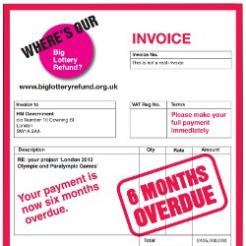Lottery bodies do not have enough say in the Olympic property sales that will determine whether the money diverted from good causes to fund the Games will be returned to them, the Public Accounts Committee has said.
PAC chair Margaret Hodge said in its post-games report that, “Lottery good causes lost money during the period running up to the Games. They need to be assured that they will get some of this back from the financial returns secured from the development of the Olympic Park.
"The Lottery provided more than £2bn towards the costs of the Games but has little influence over decisions by the London Legacy Development Corporation (LDC) about the timing and value of sales over the next two decades. It is not clear that their interest is being adequately promoted and protected.”
Decisions which rest solely in LDC’s hands include the percentage and location of affordable housing that will be provided, which would directly affect the value of the property.
Greater transparency needed
The report calls for greater transparency over decision making from the LDC, which is a mayoral body, and for the body to ensure that it prioritises the interests of the Lottery in its decisions. Returns to the Lottery, the first of which is currently scheduled for 2020, should be closely tracked over time, the report recommends.
Over £2bn of funding came from the National Lottery to help pay for the 2012 Olympic Games, £638m of which was diverted from the Big Lottery Fund, one of the main distributors of Lottery funding to good causes. The current coalition government has agreed to repay the funds over a period of 25 years, potentially completing by 2030/31.
However this is not soon enough for some. The prompt return of these funds has been the subject of a major campaign by the Directory of Social Change, the Big Lottery Refund, which says the funding could have supported 10,000 charities.
Jay Kennedy, director of policy at DSC said: "It’s encouraging to see so many of our concerns being recognised by the Public Accounts Committee, especially the acknowledgement that the Lottery’s interests have been largely ignored. Tens of thousands of charities and countless vulnerable individuals and communities have suffered as a result of this money being taken, and its return is long overdue.
“There is an opportunity here to make this right. The underspend on the Games shows that much of the money didn’t need to be taken from charities in the first place, and there is no reason to delay its return any longer.”
The financing of the Games is not yet finalised, but current projections show there is likely to be a £377m underspend in against funds received in the original funding package. However the PAC raised concerns that there was no comprehensive overview of spending that includes additional costs not included within the original funding package, such as the £766m purchase of land for the Olympic Park.
Additionality principle
PACs recommendations follow yesterday’s comments by BIG’s director of strategy, performance and learning, Ceri Doyle, that the organisation’s additionality principle is under internal scrutiny. The principle is in place to ensure that BIG funding must be additional to public sector funding, but Doyle says the funder has increasingly been receiving applications for grants that would previously have been provided by local authorities or health services. The removal of the principle could have significant consequences for projects which do not carry out core government work.
Jo Irvin, chief executive of the voluntary sector umbrella body, Navca, said that if the principle is under threat a wide-ranging debate must be held:
“This was a highly contentious issue when the Lottery was established, and the legislation only got through once the government promised that Lottery money would go to ‘good causes’, not to prop up government spending on public services. The principle was established in the 1992 White Paper and later enshrined in statute.”
“The failure so far to pay back as promised the millions of pounds Government ‘borrowed’ from the Lottery to pay for the Olympics (highlighted by the Public Accounts Committee today) only adds to concerns.”
“Lottery money comes from the people who buy tickets. There is a general understanding that the money raised will go to good causes that the state won’t fund. If there is to be a rethink this should be done by asking both the public who buy lottery tickets and the thousands of small charities and community groups who benefit from lottery funding what they think.”

| Want access to all civilsociety.co.uk content?Subscribers gain access to all expert advice, analysis, surveys, special reports and the full archive of content from as little as £43.20 per year. Find out more... |








